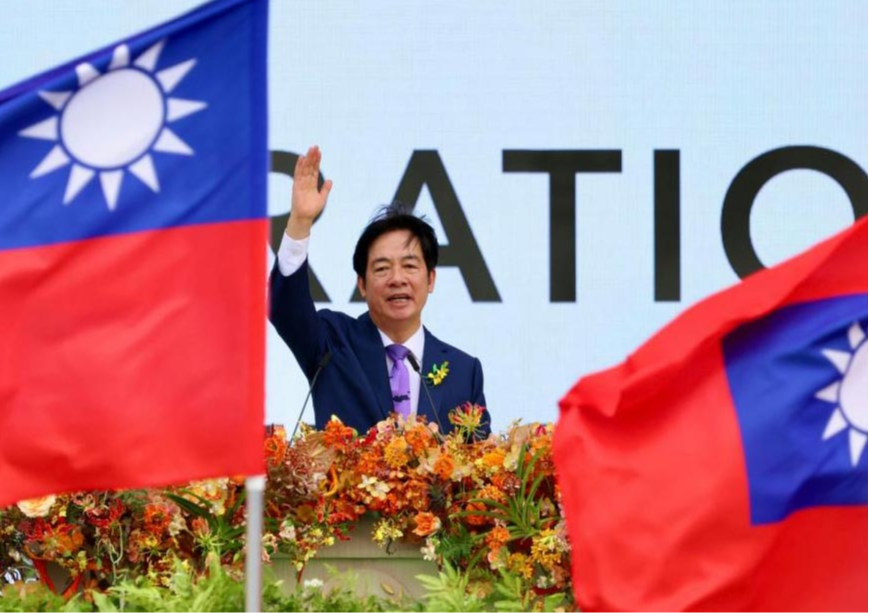-
CENTRES
Progammes & Centres
Location
Adopting a firmer stance than his predecessors, President Lai reaffirmed in his speech that the ROC is separate from the PRC, reflecting the will of Taiwan's people

On 20 May 2024, Lai Ching-te and Hsiao Bi-khim were sworn in as the Republic of China’s (ROC) 16th President and Vice-President. For the first time in Taiwan's history, a party was chosen for the third consecutive term. President Lai called this “breaking the eight-year curse”. The inaugural speech of President Lai was titled “Building a democratic, peaceful, and prosperous new Taiwan”—a speech much awaited by analysts. This piece would like to understand how different and similar President Lai’s inaugural speech was compared to his predecessor Tsai Ing-wen’s speech in 2016 and 2020.
Since 2016, the Democratic Progressive Party (DPP) has been in power in Taiwan under the leadership of Tsai Ing-wen, who also successfully managed to get re-elected in the 2020 elections.
Despite two setbacks in domestic “9-in-1” elections in 2018 and 2022, the country's highest position stayed with the DPP. The domestic election is called a “9-in-1” election because the voters vote for nine local government posts across Taiwan’s 22 cities and counties. Notwithstanding the competition from the Kuomintang (KMT) and Taiwan’s People’s Party (TPP) led by former Taipei city mayor Ko Wen-je, DPP’s Lai Ching-te managed to successfully secure the country’s highest position by obtaining 40.05 percent of the total votes polled.
President Lai’s speech covered several issues. Topics such as the current Ukraine-Russia ongoing conflict and the Israel-Hamas war were two of the international topics that the speech covered. Lai also mentioned China’s military and grey-zone activity in the region as the most significant global peace and security challenges. This highlighted that Lai has attempted to present the danger of escalation in the Taiwan Straits as a world contingency. In other words, it goes with the larger framework of “Taiwan contingency is the world’s contingency”.
The bill will provide additional security to Taiwan for any emergency procurement of military hardware and training.
Lai’s speech also acknowledged the recently concluded United States’ (US) bill Indo-Pacific Security Supplemental Appropriations Act, 2024 into law, which promises additional funds of US$1.9 billion for “Operation and Maintenance, Defense-Wide”, if necessary during an emergency for Taiwan and the Indo-Pacific region, acknowledging the US leadership role for the region. The bill will provide additional security to Taiwan for any emergency procurement of military hardware and training.
On Cross-Strait ties, Lai’s stance before becoming President has been considered “deep green”, in other words, pro-independence. Lai Ching-te, in 2017, mentioned that he is a “political worker who advocates Taiwan independence, but I am also a pragmatic pro-Taiwan independence theorist”. Such statements were considered a “separatist move” by China. At the same time, Lai’s Vice President, Hsiao Bi-khim, mentioned the “1992 Consensus” as outdated.
In his speech, President Lai reiterated to China that the ROC is separate from the People’s Republic of China (PRC), which reflects the will of the people residing in Taiwan. Some analysts also considered President Lai’s speech on Cross-Strait affairs to be of harsher language than his predecessors. Lai spoke about the “Four Commitments” initially proposed by President Tsai Ing-wen in 2022, which include economy and industry, social safety net, a free and democratic government system, and national defence. The mention of commitments can be understood as a sign that Lai will continue with some of President Tsai’s policies.
Lai spoke about the “Four Commitments” initially proposed by President Tsai Ing-wen in 2022, which include economy and industry, social safety net, a free and democratic government system, and national defence.
President Lai also acknowledged the pressing domestic issues faced by local Taiwanese citizens. Issues such as inflation, housing, wealth inequality, and electricity shortage, among others, were mentioned in the speech. These issues were critical topics that the DPP lacked, leading to losses in the domestic elections to the main opposition party, KMT. He also spoke about the importance of Artificial Intelligence (AI), which is considered the next big thing after semiconductors in the future, and it is where Taiwan should be looking forward. One significant change in the speech was that there was no mention of the New Southbound Policy (NSP, instead, “Indo-Pacific” and “world” were highlighted quite frequently. At the current stage, it is too early to say whether NSP will find its importance in Lai’s term.
The table below highlights the key terminology used by President Lai and where it stands compared to Tsai Ing-wen’s two inaugural presidential speeches.
Table 1: Drawing Comparison between the last three Presidential inaugural Speeches (2016, 2020, 2024)
| Tsai Ing-wen (2016) | Tsai Ing-wen (2020) | Lai Ching-te (2024) | |
| Democracy | 14 | 6 | 12 |
| Peace /Peaceful | 11 | 9 | 23 |
| China/People’s Republic of China (PRC) | 0 | 1 | 8 |
| United States | 1 | 2 | 1 |
| New Southbound Policy (NSP) | 2 | 1 | 0 |
| Republic Of China (ROC) | 5 | 4 | 11 |
| Taiwan/Taiwanese | 45 | 49 | 102 |
Source: Prepared by the author
The response from the PRC was expected to be swift and extensive, pre-planned since Lai was announced as President-elect earlier this year. Besides the usual verbal displeasure, spoken out through several spokespersons and ministries, China’s immediate step was to bring the Republic of Nauru’s diplomatic recognition from ROC to the PRC on 15 January 2024, bringing down the list of Taiwan’s diplomatic allies to just 12.
Militarily, Taiwan is facing a new normal by the PRC, which is the increased manoeuvres of Coast Guard ships around Kinmen/Quemoy islands controlled by the ROC/Taiwan forces. Such moves have only heightened the already strained relations between both sides.
Militarily, Taiwan is facing a new normal by the PRC, which is the increased manoeuvres of Coast Guard ships around Kinmen/Quemoy islands controlled by the ROC/Taiwan forces.
Post the inaugural speech, the Eastern Theatre Command of the PRC’s military, on 23 May 2024, announced the conduct of “Joint Sword-2024” joint military drills around Taiwan, which it called “punishment drills”. Furthermore, the Chinese Foreign Ministry called the drill “legitimate, and necessary”. The area drills follow the same pattern, conducted after the visit of Nancy Pelosi, the US House of Representatives Speaker, to Taiwan in August 2022. Such drills led to significant air and water incursions across the median line of Taiwan (de-facto aerial border between Taiwan and China) and the offshore islands of Kinmen and Matsu.
The PRC has increased its military actions against multiple countries in the region and not limited to Taiwan. The Philippines is one such case, where the PRC’s Coast Guard has increasingly gotten more aggressive in their manoeuvres, causing injury to the Philippines Coast Guard members. Such regular military escalation and exercises in the region will have multiple repercussions.
To address such a challenge, multiple mini-laterals have been formed led by the United States in the region, which has a more profound interest in the region and has strategic partnerships with the Philippines and Japan. Joint statements have been put forward by the leaders of the US, the Philippines, and Japan, calling out China to reduce its aggressive behaviour in the high seas. The joint statements also focused on greater cooperation among like-minded countries and highlighting the importance of peace in the region.
Joint statements have been put forward by the leaders of the US, the Philippines, and Japan, calling out China to reduce its aggressive behaviour in the high seas.
China’s actions around Taiwan and the region have indirectly aided in “internationalisation” of the Taiwan issue. One of the major challenges for President Lai is to maintain a balance between domestic and international expectations from him. He has acknowledged, the lack of a majority for the DPP in the Legislative Yuan, which might act against his vision. Second is how to address the “new normal” of China’s military actions against Taiwan. This is crucial for not only President Lai’s position but also, he needs to give assurance enough to the business world who would like to invest in Taiwan. Third, is on how to increase the “Taiwan cause” in the world so that its voice is heard. As President Lai did not mention about NSP in his inaugural address, it will be wait and watch to see any change or continuation on the policy. Domestically, although President Lai has acknowledged the challenges of low birth rate, housing issues, and other reforms which needs his government attention, it won’t be easy for him to bring any drastic changes.
Manoj Kumar Panigrahi is an Assistant Professor and Director of the Centre for Northeast Asian Studies at Jindal School of International Affairs, O.P. Jindal Global University.
The views expressed above belong to the author(s). ORF research and analyses now available on Telegram! Click here to access our curated content — blogs, longforms and interviews.

Dr. Manoj Kumar Panigrahi is an Assistant Professor and Director of the Centre for Northeast Asian Studies at Jindal School of International Affairs O.P. Jindal ...
Read More +